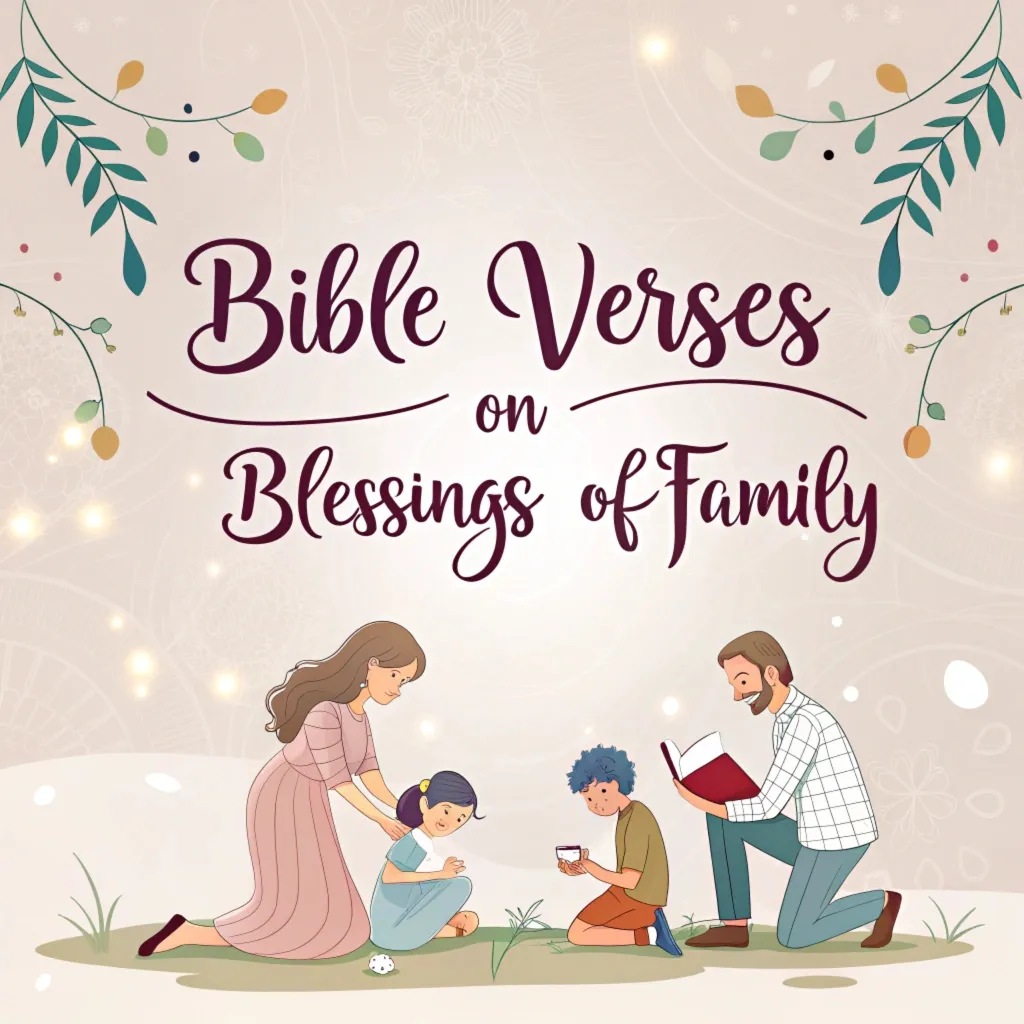18 Powerful Bible Verses on Blessings of Family: Strengthening Bonds
The Bible offers profound wisdom on family relationships. This post explores 18 key verses that highlight the blessings of family.
These scriptures provide guidance for strengthening family bonds and understanding God’s design for families. From the creation story to the teachings of Jesus, the Bible consistently emphasizes the importance of family.
These 18 verses cover various aspects of family life, including parental responsibilities, sibling relationships, and the role of grandparents.

Key Takeaways: Bible Verses on Blessings of Family
- Family is a divine gift: God establishes families as a source of love and support
- Honoring parents brings blessings and longevity
- Children are a blessing from the Lord, to be cherished and nurtured
- Love and unity are fundamental to strong family relationships
- Forgiveness and patience are crucial in maintaining family harmony
- Spiritual guidance within the family is essential for growth
- God’s promises extend to families across generations
- Family roles are defined and valued in Scripture
- Mutual respect and care strengthen family bonds
- Family is a reflection of God’s love for His people
The Foundation of Family in Genesis
The concept of family originates in the very beginning of the Bible.
Genesis 2:24 states, “Therefore a man shall leave his father and his mother and hold fast to his wife, and they shall become one flesh.”
This verse establishes the fundamental structure of family, emphasizing the unity between husband and wife.
The creation account in Genesis not only describes the origin of humanity but also lays the groundwork for family relationships.
God’s design for family is intentional and purposeful, reflecting His desire for companionship and mutual support among His creation.
This divine blueprint for family serves as a model for all subsequent generations, highlighting the importance of commitment, unity, and love within the family unit.
Honoring Parents: A Commandment with Promise

One of the Ten Commandments specifically addresses family relationships.
Exodus 20:12 instructs, “Honor your father and your mother, that your days may be long in the land that the Lord your God is giving you.”
This verse highlights the importance of respecting parents and the blessings that follow obedience.
The commandment to honor parents is unique among the Ten Commandments as it comes with a specific promise of blessing.
This divine instruction underscores the crucial role that parents play in shaping the lives of their children and the broader society.
By honoring and respecting parents, children not only fulfill a biblical mandate but also contribute to the stability and longevity of their family and community.
Children as a Blessing from the Lord
The Bible consistently portrays children as a gift from God.
Psalm 127:3-5 beautifully expresses this: “Behold, children are a heritage from the Lord, the fruit of the womb a reward. Like arrows in the hand of a warrior are the children of one’s youth. Blessed is the man who fills his quiver with them!”
This passage emphasizes the joy and fulfillment that children bring to a family.
In a world that often views children as a burden or inconvenience, the biblical perspective offers a refreshing and uplifting view.
Children are seen as a precious gift, entrusted to parents by God Himself.
This perspective not only elevates the status of children within the family but also highlights the responsibility of parents to nurture, protect, and guide these young lives.
The metaphor of arrows in a warrior’s hand suggests that children have the potential to make a significant impact on the world when properly directed.
Love and Unity in Family Relationships
The New Testament provides guidance on maintaining loving family relationships.
Colossians 3:14 advises, “And over all these virtues put on love, which binds them all together in perfect unity.”
This verse underscores the importance of love as the foundation for family harmony.
Love serves as the binding force that holds families together, creating an atmosphere of acceptance, forgiveness, and mutual support.
When family members prioritize love in their interactions, it fosters a sense of unity and belonging that can weather life’s challenges.
This biblical principle of love-driven unity extends beyond mere sentiment, calling for active demonstration of care and consideration in daily family life.
Forgiveness and Patience in Family Life

Family life often requires forgiveness and patience. Ephesians 4:32 teaches, “Be kind and compassionate to one another, forgiving each other, just as in Christ God forgave you.”
This verse encourages family members to practice kindness and forgiveness in their interactions.
The close proximity and intimate nature of family relationships often lead to conflicts and misunderstandings.
The biblical call to forgiveness and patience provides a powerful antidote to the tensions that can arise within families.
By emulating God’s forgiveness and extending grace to one another, family members can heal wounds, restore relationships, and create a home environment characterized by love and acceptance.
Spiritual Guidance Within the Family
Parents are called to provide spiritual guidance to their children.
Deuteronomy 6:6-7 instructs, “These commandments that I give you today are to be on your hearts. Impress them on your children. Talk about them when you sit at home and when you walk along the road, when you lie down and when you get up.”
This passage emphasizes the responsibility of parents in nurturing their children’s faith.
The spiritual formation of children is not meant to be outsourced to religious institutions but is primarily the responsibility of parents.
This biblical mandate encourages parents to integrate faith into everyday life, making spiritual discussions and practices a natural part of family interactions.
By consistently sharing God’s truths and modeling a life of faith, parents can lay a strong foundation for their children’s spiritual growth and development.
God’s Promises to Families
The Bible contains many promises that extend to families.
Acts 16:31 declares, “Believe in the Lord Jesus, and you will be saved—you and your household.”
This verse offers hope and assurance for the spiritual well-being of entire families.
God’s promises to families provide comfort and encouragement, especially in times of difficulty or uncertainty.
These divine assurances remind us that God’s love and care extend beyond individuals to encompass entire family units.
While each person must make their own decision to follow Christ, this promise offers hope for the spiritual influence that faith can have within a family context.
Defined Roles Within the Family
Scripture provides guidance on family roles.
Ephesians 6:1-4 states, “Children, obey your parents in the Lord, for this is right. ‘Honor your father and mother’—which is the first commandment with a promise—‘so that it may go well with you and that you may enjoy long life on the earth.’
Fathers, do not exasperate your children; instead, bring them up in the training and instruction of the Lord.” This passage outlines the responsibilities of both children and parents.
The biblical model for family roles provides a framework for healthy family dynamics.
It emphasizes mutual respect and responsibility, with each family member playing a vital part in the overall well-being of the household.
This guidance helps to establish boundaries, promote harmony, and ensure that each family member feels valued and understood within their God-given role.
Mutual Respect and Care in Family Relationships
The Bible encourages mutual respect and care within families.
1 Timothy 5:8 emphasizes, “But if anyone does not provide for his relatives, and especially for members of his household, he has denied the faith and is worse than an unbeliever.”
This verse stresses the importance of caring for family members.
The biblical emphasis on mutual respect and care within families reflects God’s heart for human relationships.
It calls family members to look beyond their own needs and consider the well-being of others.
This principle of selfless care creates a supportive environment where each family member feels valued and protected, fostering stronger bonds and a deeper sense of family unity.
Family as a Reflection of God’s Love
The concept of family in the Bible reflects God’s love for His people.
Ephesians 3:14-15 states, “For this reason I kneel before the Father, from whom every family in heaven and on earth derives its name.”
This verse highlights the divine origin of family and its significance in God’s plan.
Family relationships are meant to mirror the love and care that God has for His creation.
This divine parallel elevates the importance of family bonds and provides a higher purpose for family life.
As families strive to reflect God’s love, they not only strengthen their own relationships but also become a powerful testimony to the world of God’s character and His desire for human flourishing.
The Blessing of Grandparents
The Bible recognizes the special role of grandparents.
Proverbs 17:6 says, “Children’s children are a crown to the aged, and parents are the pride of their children.” This verse celebrates the joy and honor that grandchildren bring to their grandparents.
Grandparents play a unique and valuable role in the family structure, offering wisdom, love, and support across generations.
Their presence can provide a sense of continuity and heritage, connecting younger family members to their roots and family history.
The biblical recognition of grandparents highlights the importance of intergenerational relationships and the blessings that come from honoring and involving older family members in family life.
The Importance of Family Unity
Scripture emphasizes the value of family unity. Psalm 133:1 declares, “How good and pleasant it is when God’s people live together in unity!” This verse encourages families to strive for harmony and togetherness.
Family unity is not just a pleasant ideal but a biblical mandate that brings joy and strength to the household.
When family members work together, support one another, and prioritize their relationships, they create a powerful testimony to the world of God’s love and design for human relationships.
This unity serves as a foundation for individual growth, emotional well-being, and spiritual development.
God’s Design for Marriage
The Bible provides guidance for marital relationships. Ephesians 5:25 instructs, “Husbands, love your wives, just as Christ loved the church and gave himself up for her.” This verse sets a high standard for sacrificial love in marriage.
Marriage, as designed by God, is meant to be a reflection of Christ’s love for the church. This divine blueprint calls for selfless commitment, mutual respect, and unwavering devotion between spouses.
By following this biblical model, couples can build a strong foundation for their family, creating a nurturing environment for personal growth and the raising of children.
The emphasis on sacrificial love challenges spouses to prioritize their partner’s needs and well-being above their own.
The Role of Mothers in the Family
The Bible honors the role of mothers. Proverbs 31:28 states, “Her children arise and call her blessed; her husband also, and he praises her.” This verse recognizes the value and impact of a mother’s love and care.
Mothers play a crucial role in shaping the emotional, spiritual, and physical well-being of their families.
The biblical portrayal of motherhood celebrates the strength, wisdom, and nurturing spirit that mothers bring to their homes.
This recognition serves to elevate the importance of motherhood and encourages families to honor and support the vital work that mothers do in raising the next generation.
The Blessing of Siblings
Siblings are portrayed as a blessing in Scripture. Proverbs 17:17 says, “A friend loves at all times, and a brother is born for a time of adversity.” This verse highlights the support and companionship that siblings can provide.
Sibling relationships offer a unique form of companionship and support within the family structure.
The biblical perspective encourages siblings to view each other as allies and friends, particularly during challenging times.
This bond between brothers and sisters can serve as a source of strength, comfort, and mutual growth throughout life, fostering a sense of belonging and shared identity within the family unit.
The Family’s Role in Society
The Bible recognizes the family’s importance in society. Joshua 24:15 declares, “But as for me and my household, we will serve the Lord.”
This verse emphasizes the family’s role in spiritual leadership and community influence.
Families play a pivotal role in shaping society by instilling values, beliefs, and ethical standards in the next generation.
The biblical call for families to serve the Lord together highlights the potential impact that a united, faith-driven family can have on their community.
By living out their faith and values, families become beacons of light and agents of positive change in their neighborhoods, workplaces, and broader social circles.
God’s Promise of Generational Blessings
Scripture speaks of God’s blessings extending to future generations. Exodus 20:6 states, “but showing love to a thousand generations of those who love me and keep my commandments.”
This verse offers encouragement for families to remain faithful to God.
The concept of generational blessings provides a powerful motivation for families to prioritize their faith and obedience to God.
It reminds us that our choices and actions today can have a lasting impact on future generations.
This promise encourages families to cultivate a legacy of faith, passing down spiritual truths and godly values that can influence their descendants for generations to come.
The Eternal Nature of Family Love
The Bible teaches that love, including family love, is eternal. 1 Corinthians 13:13 concludes, “And now these three remain: faith, hope and love. But the greatest of these is love.”
This verse reminds us of the enduring nature of family love.
The eternal quality of love, as described in Scripture, gives profound meaning to family relationships.
It suggests that the bonds formed within families have the potential to transcend time and even death.
This perspective encourages family members to invest in their relationships, knowing that the love they share has lasting significance.
It also offers comfort in times of loss, reminding us that the love we have for family members continues even when we are separated.
FAQs About Bible Verses on Family Blessings
What does the Bible say about the importance of family?
The Bible consistently portrays family as a divine institution, emphasizing its role in providing love, support, and spiritual guidance. It teaches that family is a blessing from God and a reflection of His love for humanity.
How does the Bible define family roles?
Scripture outlines specific roles for family members, including children honoring parents, parents nurturing and instructing children, and spouses loving and respecting each other. These roles are designed to promote harmony and spiritual growth within the family unit.
What blessings does the Bible promise to families?
The Bible promises various blessings to families, including long life, prosperity, and spiritual well-being. It also speaks of God’s faithfulness extending to future generations of those who love and obey Him.
How can families apply biblical principles to strengthen their relationships?
Families can strengthen their relationships by practicing love, forgiveness, patience, and mutual respect as taught in Scripture. Regular prayer, Bible study, and worship together can also help build a strong spiritual foundation for the family.
What does the Bible say about dealing with family conflicts?
The Bible encourages forgiveness, patience, and love in dealing with family conflicts. It teaches the importance of addressing issues with kindness and understanding, always seeking reconciliation and unity.

Samantha is the author of Inner Light Spirituality, where she shares insights and guidance to inspire others on their spiritual journeys. With a passion for exploring various spiritual traditions, Samantha aims to make spirituality accessible and relatable. Through her writing, she encourages readers to embrace their unique paths and find meaning in their experiences. When not writing, she enjoys meditating and connecting with nature.







